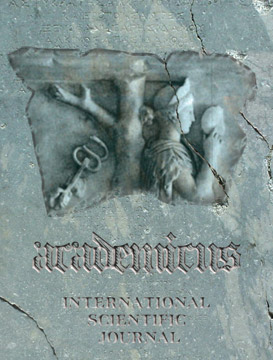Title:
Epistemic Justice in Nature Reserves Management
Full Reference List:
| 1. | Akpan, W. (2011). ‘Local’ knowledge, ‘global’ knowledge, ‘development’ knowledge: Finding a new balance in the knowledge power play. South African Review of Sociology, 42(3), 116-127. https://doi.org/10.1080/21528586.2011.621244 |
| 2. | Antonsich, M. (2010). Searching for belonging–an analytical framework. Geography compass, 4(6), 644-659. https://doi.org/10.1111/j.1749-8198.2009.00317.x |
| 3. | Armstrong, C. (2017). Justice and Natural Resources: An Egalitarian Theory. Oxford: Oxford University Press. |
| 4. | Baker, S., & Constant, N. L. (2020). Epistemic justice and the integration of local ecological knowledge for marine conservation: Lessons from the Seychelles. Marine Policy, 117, 103921. https://doi.org/10.1016/j.marpol.2020.103921 |
| 5. | Ballard, K. (2018). Inclusion, paradigms, power and participation. In Towards inclusive schools? (pp. 1-14). Routledge https://www.taylorfrancis.com/chapters/edit/10.4324/9780429469084-1/inclusion-paradigms-power-participation-keith-ballard |
| 6. | Börner, J., Schulz, D., Wunder, S., & Pfaff, A. (2020). The effectiveness of forest conservation policies and programs. Annual Review of Resource Economics, 12, 45-64. https://doi.org/10.1146/annurev-resource-110119-025703 |
| 7. | Fay, D. (2008). Property, subjection and protected areas: The ‘restitution’ of Dwesa-Cwebe nature Reserve, South Africa. In The Rights and Wrongs of Land Restitution (pp. 45-62). Routledge-Cavendish. |
| 8. | Fishel, S., Winter, C. J., & Burke, A. (2021). Between Ecology and Indigeneity. Borderlands Journal, 20(1), 1-10. https://doi.org/10.21307/borderlands-2021-001 |
| 9. | Fricker, M. (2007). Epistemic injustice: Power and the ethics of knowing. OUP Oxford. |
| 10. | Hoza, D. M. (2012). The Kid Loses to Domination: Environmentality, modern domination and subjecthood in Ken Kesey’s “Sometimes a Great Notion”. The University of Utah. https://www.proquest.com/docview/1033500206?pq-origsite=gscholar&fromopenview=true&sourcetype=Dissertations%20&%20Theses |
| 11. | Iovan, M. (2014). Eco-Education: A Required Element of Public Policies for Sustainable Social and Economic Development. Academicus International Scientific Journal, 9, 14-28. https://doi.org/10.7336/academicus.2014.09.01 |
| 12. | Kimmerer, R. (2013). Braiding sweetgrass: Indigenous wisdom, scientific knowledge and the teachings of plants. Milkweed editions. |
| 13. | Klass, A. B. (2020). Eminent Domain Law as Climate Policy. Wis. L. REv., 49. |
| 14. | Koontz, T. M., Jager, N. W., & Newig, J. (2020). Assessing collaborative conservation: A case survey of output, outcome, and impact measures used in the empirical literature. Society & Natural Resources, 33(4), 442-461. https://doi.org/10.1080/08941920.2019.1583397 |
| 15. | López-Rivera, A. (2020). Blurring global epistemic boundaries: The emergence of traditional knowledge in environmental governance (No. 25). Global Cooperation Research Papers. https://hdl.handle.net/10419/221737 |
| 16. | Mathews, F. (2022). Conservation needs to include a ‘story about feeling’. Biological Conservation, 272, 109668. https://doi.org/10.1016/j.biocon.2022.109668 |
| 17. | McCarthy, C., Shinjo, H., Hoshino, B., & Enkhjargal, E. (2018). Assessing Local Indigenous Knowledge and Information Sources on Biodiversity, Conservation and Protected Area Management at Khuvsgol Lake National Park, Mongolia. Land, 7(4), 117 https://doi.org/10.3390/land7040117 |
| 18. | Medina, J. (2013). The epistemology of resistance: Gender and racial oppression, epistemic injustice, and the social imagination. Oxford University Press. |
| 19. | Miftari, A. (2020). Sustainable Agriculture and Farmers Choices Among Short Term Efficiency and Preserving the Future. Academicus International Scientific Journal, 21, 89-100. https://doi.org/10.7336/academicus.2020.21.08 |
| 20. | Nyamahono, J. D. (2023). Participation dynamics in the management of protected areas: the case of Dwesa-Cwebe Nature Reserve and its adjacent communities, Eastern Cape Province, South Africa (Doctoral dissertation, University of Fort Hare). https://core.ac.uk/download/pdf/588487734.pdf |
| 21. | Petersmann, M. C. (2021). Contested indigeneity and traditionality in environmental litigation: the politics of expertise in regional human rights courts. Human Rights Law Review, 21(1), 132-156. https://doi.org/10.1093/hrlr/ngaa054 |
| 22. | Prasad, J. (2024). The Primacy of Politics: Interrogating Indigeneity and Ecology in India. https://edoc.hu-berlin.de/bitstream/handle/18452/28822/SAC-2023-11-ReviewEssay-Prasad.pdf?sequence=1 |
| 23. | Smith, L. T. (2021). Decolonizing methodologies: Research and indigenous peoples. Bloomsbury Publishing. |
| 24. | Sowman, M & Sunde, J. (2018). Social impacts of marine protected areas in South Africa on coastal fishing communities. Ocean and Coastal Management, 157, 168–179. https://doi.org/10.1016/j.ocecoaman.2018.02.013 |
| 25. | Al-Mansoori, F., & Hamdan, A. (2023). Integrating Indigenous Knowledge Systems into Environmental Education for Biodiversity Conservation: A Study of Sociocultural Perspectives and Ecological Outcomes. AI, IoT and the Fourth Industrial Revolution Review, 13(7), 61-74. https://scicadence.com/index.php/AI-IoT-REVIEW/article/view/10 |
| 26. | Sunde, J. (2014). Customary Governance and Expressions of Living Customary Law at Dwesa-Cwebe: Contributions towards Small-scale Fisheries Governance in South Africa. Doctoral thesis. University of Cape Town. https://open.uct.ac.za/items/a8d696eb-1e1f-46b7-a39e-67b2b73834b6 |
| 27. | Tsawu, S. (2022). Traditional authorities and co-management of protected areas in South Africa: the case of Dwesa-Cwebe Nature Reserve in the Eastern Cape. https://open.uct.ac.za/items/79d21964-3302-4caf-a551-a6f2ba90f0c3 |
| 28. | Yuval-Davis, N. (2016). Power, Intersectionality and the Politics of Belonging. In: Harcourt, W. (eds) The Palgrave Handbook of Gender and Development. Palgrave Macmillan, London. https://doi.org/10.1007/978-1-137-38273-3_25 |
Back to article
Academicus
International Scientific Journal
pISSN 2079-3715
eISSN 2309-1088
Address:
Sheshi i Flamurit, Rruga Muze
Al-9401 Vlorë, Albania
Tel: +355 68 60 60 555
info@academicus.edu.al
https://academicus.edu.al


